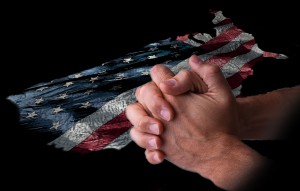Humanists Respond to National Day of Prayer Case Setback

“This ruling threatens the foundation of church and state separation which this country thrives on,” said Roy Speckhardt, executive director of the American Humanist Association. “A government institution, let alone the President of the United States, has no business endorsing any form of prayer. To dismiss this challenge is to move the country a step further from the religious freedoms its citizens value.”
In April 2010 U.S. District Judge Barbara B. Crabb found the National Day of Prayer to be in violation of the First Amendment, which prohibits laws regarding an establishment of religion. “Its sole purpose is to encourage all citizens to engage in prayer,” declared Judge Crabb, “an inherently religious exercise that serves no secular function.”
“Judge Crabb’s extremely thorough, thoughtful and well reasoned decision concluded, after finding that the plaintiff had standing, that the National Day of Prayer statute violated the Establishment Clause because a governmental call for prayer amounts an unconstitutional state endorsement of religion,” said Bill Burgess, attorney and legal coordinator of the American Humanist Association’s legal arm, the Appignani Humanist Legal Center.
“The Judicial Branch does not censor a President’s speech,” read Judge Easterbrook’s decision. “Those who do not agree with a President’s statement may speak in opposition to it; they are not entitled to silence the speech of which they disapprove.”
The decision went on to state, “Plaintiffs contend that they are injured because they feel excluded, or made unwelcome, when the President asks them to engage in a religious observance that is contrary to their own principles. It is difficult to see how any reader of the 2010 proclamation would feel excluded or unwelcome.”
“The Seventh Circuit’s decision in this case continues a disturbing trend in the federal courts of activist conservative judges using an overly broad reading of procedural rules such as standing to refuse to even hear and consider arguments that the government is violating the separation of church and state,” continued Burgess. “If this trend is not reversed, it will become almost impossible to challenge even blatantly unconstitutional government actions in court because these courts will assert that the plaintiff has not been injured and therefore lacks standing.”
The American Humanist Association is promoting an alternative to the National Day of Prayer with the more inclusive National Day of Reason. In addition to celebrating reason, its primary purpose, it aims to raise public awareness about the threat to religious liberty posed by government intrusion into the private sphere of worship. More information can be found at http://www.nationaldayofreason.org hosted by The American Humanist Association and the Washington Area Secular Humanists. The site includes listings of National Day of Reason events, facts and statistics, essays on church-state separation, and an array of related resources.
To view this press release, visit: http://www.americanhumanist.org/news/details/2011-04-humanists-respond-to-national-day-of-prayer-case-set.
